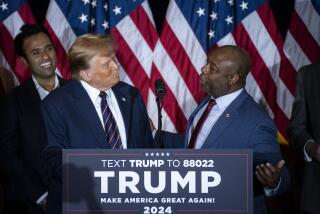Breaux to Retire From Senate
- Share via
WASHINGTON — Sen. John B. Breaux of Louisiana, a rare centrist Democrat in an increasingly polarized Congress, announced Monday that he would not seek reelection in 2004.
That makes Breaux the fifth Southern Democrat to step down in 2004 rather than run again in a region that has been increasingly inhospitable to his party.
Breaux would have been a shoo-in for reelection, and his decision to forgo a fourth term complicates Democrats’ efforts to capture control of the Senate. Republicans now hold a 51-seat majority in the 100-seat chamber.
Breaux’s departure would also take from Congress one of its most skilled legislative middlemen. At a time when lawmakers are more prone than ever to split along party lines over major issues, Breaux is one of a vanishing breed that thrives on working across party lines.
To the dismay of some liberal Democrats, Breaux was central to building bipartisan coalitions to pass two of President Bush’s biggest domestic policy accomplishments -- his 2001 tax cut and the recent bill to expand and overhaul Medicare.
Breaux, 59, announced his plans to retire at a Baton Rouge, La., news conference, but it had long been rumored that he would step down. He has joked with Sen. Don Nickles (R-Okla.), who is also retiring next year, about joining together in a lobbying partnership.
At one point while Breaux and Nickles were embroiled in the long, often tedious negotiations this fall over Medicare legislation, Nickles slipped Breaux a note asking him, “Do you really want to do this for seven more years?”
Breaux is secure enough in his seat that he could probably have spent his entire career in the Senate, as did Southern mainstays such as the late Strom Thurmond (R-S.C.). But he was attracted to the idea of pursuing another career while he was still young enough.
“I can either try to beat Strom Thurmond’s record, or I can play tennis in Bermuda on weekends,” Breaux joked with one confidante while he was making his decision.
He pondered that choice until his self-imposed deadline of Dec. 15 to make up his mind. “There comes a time in every career when it is time to step aside and let others step up and serve,” said Breaux. “And for my family and me, that time has arrived.”
The four other southern Democrats who have announced their retirement are John Edwards of North Carolina, Bob Graham of Florida, Ernest F. Hollings of South Carolina and Zell Miller of Georgia. All four leave behind competitive seats that Democrats may have to fight to keep.
Democrats are in a stronger position in Louisiana. They’ve won two major statewide offices in the last two years -- the other Senate seat went to Mary Landrieu in 2002; the governorship went to Democrat Kathleen Blanco this fall.
Still, Breaux’s retirement gave Republicans an opening to contest a seat that would have been invulnerable if the incumbent had stayed. Republicans are encouraged by the fact that the recent races for Senate and governor were very close, and they argue that any Republican running in 2004 would be helped with Bush at the top of the ticket.
The leading contenders to succeed Breaux are two members of the states’ House delegation, Democrat Christopher John and Republican David Vitter. A key question is whether GOP gubernatorial candidate Bobby Jindal would make a run for the Senate. State party officials who are backing Vitter do not expect Jindal to run.
Breaux was the youngest member of Congress when he was first elected to the House in 1972. He was elected to the Senate in 1986.
Throughout his career Breaux has been a wily legislative wheeler-dealer. Explaining in 1981 his support for President Reagan’s budget policies -- in exchange for concessions on natural gas and sugar policies important to Louisiana -- Breaux quipped that his vote could not be bought, but “it can be rented.”
His southern conservatism and willingness to compromise have put him in a dwindling minority in his party, which has become increasingly confrontational during Bush’s presidency.
“As the instances of bipartisanship in the Senate become more rare, John’s commitment to finding meaningful compromises will be dearly missed,” said Senate Minority Leader Tom Daschle (D-S.D.).
Explaining his approach in his speech announcing his retirement, Breaux said, “It is my hope that cooperation and legitimate compromise between our political parties will not be seen as political failure, but rather as a means of building a stronger democracy that better serves our nation.”
More to Read
Sign up for Essential California
The most important California stories and recommendations in your inbox every morning.
You may occasionally receive promotional content from the Los Angeles Times.














